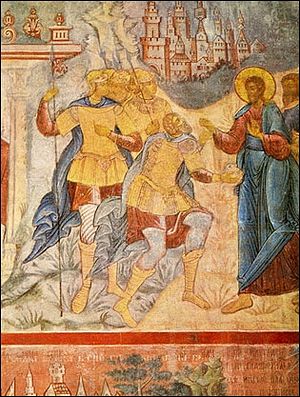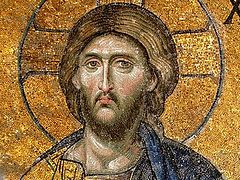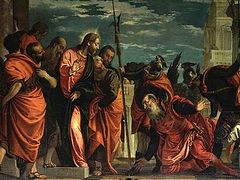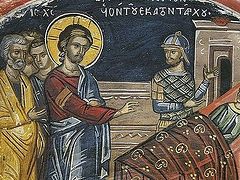 Photo: iakovlevskoe.ru In the name of the Father, of the Son and of the Holy Spirit.
Photo: iakovlevskoe.ru In the name of the Father, of the Son and of the Holy Spirit.
How great must have been the faith of the Centurion who came to Christ asking for a healing of his servant, whom he loved, who was faithful to him. He heard Christ say, “I shall come and work a miracle in thy home”, and he could answer, “Don't come! A word of Thine would be enough to restore the health of my servant!”
This is an event of the life of Christ; it is an event that touched not only the Centurion, not only his servant, but every member of the household. He came without Christ, and the servant was healed.
Who of us, in dire, agonizing pain is capable of turning to the Lord, presenting Him a request, asking Him to show mercy and to manifest His power, and when the Lord says to us, in our hearts, “I shall come, I shall work this miracle for you”—who of us would have the courage to say, “No, Lord! Thy word is enough!...”
We have the Gospel, we have the example of the Saints, many, many of whom built a life of saintliness on one saying of the Gospel which they took seriously and to which they devoted all their energies, all their life. We have the Gospel, the word, and that word that can heal a life, it can transform people, transfigure relationships, human souls, and human lives. Who of us ever said to the Lord, “Thy Gospel sufficeth unto me”? And how often do we turn to the Lord and say, “Yes, Lord, I have read it all, but come Thyself, speak to me, speak a word which is not written, speak a word that would like iron or fire penetrate into my heart! Speak again, again, again, O Lord!” And so we pass over the whole Gospel, the whole of God’s message, the whole example of Christ, all that we see in the Apostles and the later Saints because we want a new revelation, a new word.
And do you remember also, when Christ commanded His disciples to cast a net into the sea and this net brought a multitude of fish, St. Peter suddenly saw Who He was. He had heard it all, he had heard the Sermon on the Mountain, he had been with Christ from the beginning, and yet he saw only dimly who He was. At that moment, the moment of a material miracle he realized Who was in his boat, and he said, “Lord, leave this boat! I am a sinner, I am unworthy of Thy presence!”
And again, who of us, at moments when the Lord comes close to us, have the thought of saying such words, realizing because of the holiness of Christ, the holiness of God, how unworthy we are of Him, of His life, His teaching, His example, His death, His descent into hell, to the very rock bottom of evil. And this hell is not only an image; isn't it within us? Isn't there in us a darkness that needs more than enlightment—the Light of God, God, the light of the world.
Let us think of what we hear. I have just come back from Russia, and whenever I come, I am awed by what I see there. Not by the great services, but the people who for more than half a century have carried the burden of the cross, and how awe-inspiring—I should say, how humbling—it is to one who has to speak to people whose life is a preaching of the Gospel, while one’s own is a shame of Christ. Yes, it is true what the Gospel says that by our words shall we be judged, saved or condemned. How frightening it is to have by duty, by necessity to speak words of truth and to know that every word condemns you.
And so, when a priest comes out, makes a sign of the Cross, putting himself under the protection of the Crucifix, the death and sacrificial love of Christ—pray for that man who is to declare the Gospel, perhaps unto judgment and condemnation of his own self, and for the salvation of your souls. And then perhaps this prayer will sustain the preacher; and the preacher speaking God’s own words, aided by the grace of God, might sustain your life and help you to reach Christ and not the preacher; to suddenly realize that the preacher does not exist—there is only the message. Remember! Saint John the Baptist was not called a “preacher” who proclaimed the word of God; he was called, “a Voice crying out in the wilderness”. It was not a man—it was a message. Receive the message, pass by the messenger, and receive the message as Christ describes, as good earth that engulfs the seed, feeds it and brings fruit, the fruit of life—not of feelings, not of thoughts, but a life which is that of God incarnate, Christ's life in us. Amen.



